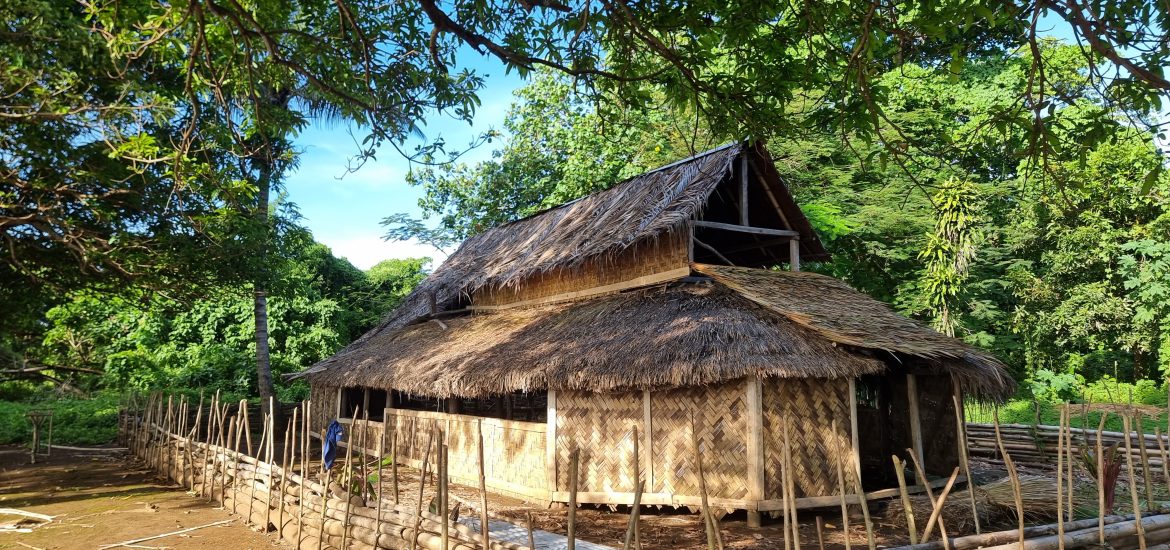Usually, introducing yourself as a missionary in Papua New Guinea gives you good standing with the people. The history of missionaries introducing the gospel to the people of PNG is recent and powerful. They also brought the modern world through services such as schools, medical clinics and infrastructure, good things that benefited the people. Also, translating the Bible to their own language gives them a written language and opens up a whole new world of understanding. But what happens when missionaries leave? What legacy do they leave behind?
On our first sail out of Madang we decide to anchor outside a little village on Long Island. This place looked small on the satellite image and we were excited to be in a smaller place with a more manageable population. Right away we are met by the village elder and his grandson in a canoe. He directs us to come closer to the village and we anchor in black sand. Soon, a couple of more canoes come out to us, but only three total. We are invited to visit their village, so we launch our dingy and I row to shore with Naomi and Billy, now that our outboard motor has been stolen.
We arrive in a beautiful little village by a black sand beach with little leaf huts made entirely from bush materials. They have little piglets tied up under their huts and we soon find out that they have a water well in the village as well. Their pride was their church that they were currently building. The entire outer structure was finished and it looked beautiful! Turns out that the village is Lutheran and I told them that I am Lutheran too and I complemented them on their beautiful church. Honestly one of the nicest I have seen. They also had the entire New Testament translated into their own language.
We continue the tour of the village and I ask them if they have schools. They don’t. One kid has gone to school in Madang which is far away and not cheap. We ask if they have a priest for their church, but they don’t. One priest comes sometimes from the neighbor island. I ask if they can read the Bible. The village elder can read in Tok Pisin, but only his son can read the local language Bible. I notice a water tank in the middle of the village, standing by itself. It’s from the clinic they say, but it has burned down.
The clinic was built in 2004 and was operational for many years. The Bible was finished and printed in 2013 and had a first printing of 800 copies. But with no schools it is hard to learn how to read their own Bible. Missionaries have been active here and quite recently too. But now there is no sign of them. Only a water tank standing in the middle of the village, a delapitated clinic and a Bible only one person in the village can read. What happened?
I believe that there is power in God’s word to transform a whole community to be developed and thriving. We know this is true, only through looking at our western society. But this village, even though beautiful, was not doing well. They were asking us for all sorts of stuff. They wanted medicine for pain and antibiotics for pain too, as well as anything else that could help them against skin disease and stomach pain. They wanted rice and salt and shampoo and body lotion. We had brought a bag of detergent and a small ball for the kids as gift to the village, but it was not enough.
We brought back the village elder to the boat, together with a man with a cut in his foot. We gave the elder some paracetamol for his back pain and three bars of medical soap to help the many people in the village against skin diseases. We cleaned and bandaged the man’s wound, as it was not infected. Naomi found some salt as well for good will. More people were coming out to see us and it was as if they were waiting for something. The elder kept asking for more medicine and others were asking for other things such as fishing line and batteries. It was getting uncomfortable. We want to help, but giving out these things is not sustainable and it will hurt more than help.
Finally the elder asked too much for poor Naomi who were trying her best to make everyone happy. She told him off, saying that we are only missionaries, not a medical ship! He seemed to take the hint and excused himself shortly after that. Slowly all the rest of the people started leaving too, realizing that there was nothing more for them here. Usually PNG people are happy to be around you and to get to know you, but this village seemed to be only after getting free stuff from us.
As I have been pondering this encounter, I have come to realize that we may be defining the word missionary differently than the people of this village. Maybe the word missionary for them means free medicine and free stuff. Maybe that’s their experience? I wish I had asked more questions surrounding the previous missionaries, but I didn’t. All I am left with is wondering what has happened and what their future holds. I encouraged the one man who knew how to read their local language to teach it to others, but I wish I had done more for them.
